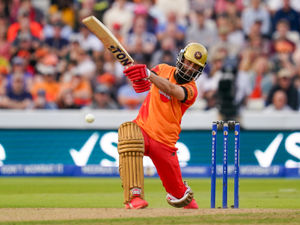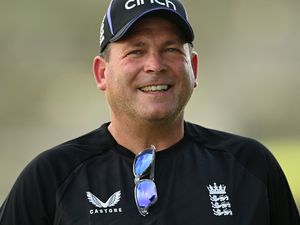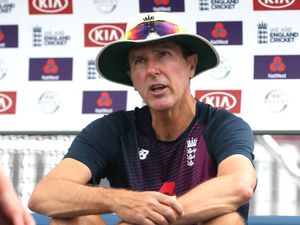Worcestershire's Joe Leach can reflect with great pride on a superb innings
Joe Leach knows it will be a few weeks before life really begins to feel different.
October is currently playing out the way his October usually does.
“I’m kicking around the house. But then I’m always kicking around the house at this time of year,” he says.
Yet at the start of next month, Worcestershire’s players will return to New Road for winter training and for the first time in more than a decade Leach will not be among them.
“That’s the point it will probably hit me,” he adds. “At the moment, it still feels like a normal end to the season.”
After 13 years, including five of them as captain, 252 matches, nearly 27,000 balls bowled and 586 wickets taken across all formats, not to mention a more than handy 5,000 runs scored, Leach walked off the field for the final time as a professional cricketer on September 29.
His decision to retire, announced a couple of months previously, might have appeared premature to some. Still aged just 33, Leach remained an integral part of the Pears XI. He was still living a dream first nurtured as a youngster at Stone Cricket Club, through his education at Shrewsbury School and playing in the Minor Counties for Shropshire.
Yet for Leach, the timing felt exactly right.
“I didn’t want to be one of those people who is clinging on,” he explains. “That is not what my career has been about.”
Accolade
“Clinging on” is what Leach feared he would be doing due to ongoing issues with a knee injury.
He underwent surgery in January and though he surpassed most medical expectations by being ready to start the season, as the summer progressed it became clear his body would never be quite what it was before.
He still finished as the county’s leading wicket-taker in red ball cricket, an accolade he shared with Nathan Smith and Tom Taylor after the trio claimed 27 scalps each.
But Leach also missed three matches and required an injection to help him through the final months of the campaign. The man on whom Worcestershire had always been able to depend, was suddenly a little less dependable.
“I was able to do enough, but not in the way I would want,” says Leach. “Although I played the vast majority of the Championship season it became apparent I would need to be more managed, moving forward and probably miss more cricket.
“My biggest strength has been my consistency and availability, being able to play week-in, week-out, day-in, day-out and be trusted to bowl my overs.
“When it starts to hurt, the enjoyment goes that little bit. The knee was probably the catalyst to a load of other thoughts which happen for most sportspeople who retire. It just felt time.”
One of the biggest things Leach had to consider was his quality of life after cricket. When kicking a football around the garden with his two young sons suddenly began to feel painful it provided further pause for thought.
“I have obviously done significant damage to my knee over the course of my career,” he says. “I have already had one operation.
“There was no immediate call to stop but the advice was starting to get toward: ‘You can’t keep doing this forever’.
“Cricket and seam bowling in particular is brutal on the body and there are plenty of fast bowlers who have the scars to show for it.”
Leach is aware many athletes don’t get to choose their moment to depart the stage and he has undoubtedly gone out on a high.
Promoted from Division Two the previous summer, the Pears were tipped to go straight back down by the vast majority of observers but in the end stayed up with room to spare despite colossal practical and emotional challenges, from the floods which rendered New Road unplayable until late May, to the seemingly endless injury list and the tragic, untimely death of young spinner Josh Baker.
Leach, winner of three promotions, believes this season’s sixth-placed finish in Division One ranks as Worcestershire’s best achievement during his time at the club.
“If you ask why it happened, I would say there is an unbelievable team culture and spirit and Worcester right now, a great team and management staff who are desperate to play for each other,” he says.
“All of those are cliches, of course but that is genuinely the case at Worcester and that showed in the performance and the numbers. People had good seasons, but no-one stood out and that showed our togetherness and how we performed for each other over the season.”
Leach continued: “We have been that perennial yo-yo club so to get a foothold in the First Division this year was big. Although winning promotions bring about a more immediate emotion, this has been the most satisfying season.
“The collectiveness of the group should not be mistaken for people not being talented or very good cricketers in their own right.
“But the gold dust on top for us is not a star overseas player or one individual, it is the collective performance and playing for each other. Moving forward, that has to remain the same.”
Leach will now be a keen observer beyond the boundary as he plots out his post-playing career. His options are wide open, though some attention will be given to Nexx Cricket, the business he set up with former Shrewsbury team-mate Ed Foster, which manufactures playing equipment specifically for women and girls.
“We realised the female game was completely under-represented and under-resourced when it comes to equipment,” says Leach. “I guess the business deserves a bit more time putting into it. That is what I will be doing in the short term, to see if we can grow it and make it a more recognisable brand. We want more people to realise the good work we are doing.”
In the long-term, Leach will wait to see what opportunities arise, though utilising the masters degree in sports leadership he gained in 2022 from the University of Buckingham seems an obvious move.
Intriguingly, his dissertation studied the impact of The Hundred on men’s cricket and correctly predicted the arrival of private investment in the competition, a development which has the potential to completely change the face of the sport in England. Having previously shown such prescience, it seems pertinent to probe Leach on what he expects to happen next.
“This really isn’t a cop-out – but it is impossible to predict!” he laughs. “The next three or four years for cricket, globally, are so difficult to guess.
“The only thing you probably can assume is the status quo isn’t going to stay the same.
“It is very obvious franchise cricket is growing and taking more of a hold. The sale of The Hundred, if and when it goes through, means the English game will have a chunk of that as well.
“To be honest, the English game needs more investment and money or it is going to be left a long way behind. The only way to make the game sustainable is to get some investment into it.”
Concern surrounds whether the introduction of private investors could, at some point, threaten the existing county structure.
“I am very much a traditionalist at heart,” says Leach. “I love the 18 counties and very much hope they can remain and be competitive.
“That is very much the hope, that private investment can sustain rather than ruin the model.
“I would hope there are enough people, within the game domestically, who would want to see it remain and be competitive and use the new money to help that.
“To grow the sport at the bottom end you need 18 points of entry into the professional game otherwise you are just going to have a very steep pyramid which isn’t sustainable.”
Leach’s experience and voice, you feel, would be valuable in the discourse, but for the time being, such discussions can wait.
His immediate focus is on relaxing and spending time with his young family, while there will be more chances to watch his beloved Wolves, albeit like every other supporter he is hoping results rapidly improve.
In between there will be moments for reflection on all that has come before, the wins, the losses but mostly the sheer enjoyment of playing sport for a living.
“The overall memory, the overall feeling I get is just happiness and contentment that I managed to share a dressing room with so many great people and the fun we had,” says Leach.
“That is the hardest thing to walk away from. You work hard for success on and off the pitch. “But it is the dressing room, that will be the thing which is hardest to leave.”




